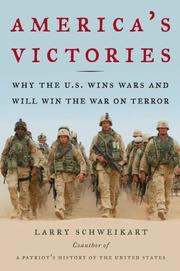Check nearby libraries
Buy this book

From the Revolutionary War to the War on Terror, the American military has consistently beaten the odds. It's not luck.America's armed services are under attack. From college campuses to the floor of the Senate, the Iraq war is portrayed as a quagmire, the Army is described as "broken," and our men and women in uniform are maligned as torturers. Hollywood keeps producing anti-war films, and the media celebrates liberal anti-military activists such as Cindy Sheehan.These critics fail to understand the real nature of the American military. By seeing everything through the distorted lens of Vietnam — a war shrouded in harmful myths —they have lost sight of our country's real military record, and the factors that have enabled us to win with remarkable consistency, in situations even more dire than Iraq.In America's Victories, Professor Larry Schweikart restores the truth about our amazing military heritage. Just as he did in his acclaimed previous book, A Patriot's History of the United States, Professor Schweikart cuts through the distortions passed along by academia and the media.Why do Americans win wars, and why is it all but certain we will win the War on Terror? The biggest answer is that, far from being a cruel, bloodthirsty nation, eager to acquire other people's resources, we value the sanctity of life more than any military culture in history. This fundamental trait has led, over the last two centuries, to more humane treatment of prisoners, more daring POW rescues, and more effective operations than any comparable power.The American military has also benefited from a combination of other virtues: the ability to learn from losses and mistakes; the unique autonomy entrusted to our troops; and, ironically, the constant improvements forced by anti-war protestors. When coupled with an unmatched free-market economy, America's fighting forces are fearsome.America's Victories explains how this culture of victory has endured through the darkest moments of World War II, Korean, and Vietnam, and how it has helped our troops prove their critics wrong over and over, from the Battle of New Orleans under Andrew Jackson to the war in Afghanistan under Tommy Franks. Among the book's many revelations, you'll learn:* How the military since the time of the Revolution has constituted an incredible "melting pot" of ethnicities and social classes, creating a culture blind to origins, but open to talent and desire. How the Higgins Boat (key to the success of D-Day) and the Jeep (the backbone vehicle of World War II) were created by American entrepreneurs, not central planners, and how our economic capacity buried the Axis powers. Why Abu Ghraib does NOT contradict our respect for individual human life, including our exceedingly humane treatment of prisoners of war, and how a better example of Americans' view of prisoners is the POW rescue at Canabantuan. How anti-war protestors, by emphasizing "body bags," have led our military inexorably toward more efficient operations that minimize casualties. How Americans (not the French) put into practice Napoleon's maxim that "every soldier carries a Marshal's baton in his knapsack," and made our front line troops the most autonomous fighters in history.Professor Schweikart acknowledges America's blemishes and weak moments, but also exposes the deep-seated anti-American bias of the Left. Based on the lessons of history, he concludes that we will win the War on Terror, through a weapon more powerful than any bomb or rocket: our unique military culture.
Check nearby libraries
Buy this book

Previews available in: English
| Edition | Availability |
|---|---|
|
1
America's Victories
2008, Penguin Group USA, Inc.
Electronic resource
in English
1429514957 9781429514958
|
zzzz
Libraries near you:
WorldCat
|
|
2
America's Victories: Why the U.S. Wins Wars and Will Win the War on Terror
May 29, 2007, Sentinel Trade, Sentinel
Paperback
in English
1595230386 9781595230386
|
zzzz
Libraries near you:
WorldCat
|
|
3
America's Victories: Why the U.S. Wins Wars and Will Win the War on Terror
May 18, 2006, Sentinel HC
Hardcover
in English
1595230211 9781595230218
|
aaaa
Libraries near you:
WorldCat
|
Book Details
First Sentence
"On paper, the 78,100 American and Filipino soldiers who squared off against the 200,000 Japanese troops on Bataan in late March, 1942, seemed a solid, if not formidable, force."
Classifications
The Physical Object
ID Numbers
Community Reviews (0)
Feedback?| December 17, 2022 | Edited by ImportBot | import existing book |
| December 17, 2022 | Edited by ImportBot | import existing book |
| October 14, 2020 | Edited by ImportBot | import existing book |
| July 22, 2019 | Edited by MARC Bot | remove fake subjects |
| October 16, 2009 | Created by WorkBot | add works page |











